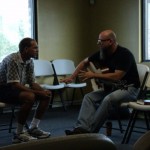Replay: We will talk face to face
Five years ago, I wrote a post called “We will talk face to face.” Today, long distance communication is almost expected: phone, email, video chat, text, etc. When the New Testament was written, long distance communication was also prevalent, typically in the form of letters. In fact, most, if not all, of the New Testament was originally long distance communications. However, as I examined in this post, the authors understood that face-to-face communication was still very important. It’s just as important today.
————————————
We will talk face to face
I was reading 3 John again a few nights ago. I stopped at the end when I read these sentences:
I had much to write to you, but I would rather not write with pen and ink. I hope to see you soon, and we will talk face to face. (3 John 1:13-14 ESV)
John loves the people that he’s writing. In fact, he loves them so much that he prefers to see them “face to face” instead of simply writing to them. Now, John is known as “the beloved disciple”, but he says some things in this short letter that are not very pleasant to say. For instance, he calls out Diotrophes for loving to be in a preeminent position and for not taking care of brothers and sisters who are traveling through his area. Do you think John would even prefer to talk about this face to face?
You see, I love to encourage people face to face. I love to thank people and praise them face to face. But, I don’t like to admonish or chastise people face to face. I don’t like confrontation, but sometimes confrontation is necessary, and it seems best to confront someone face to face.
A few days ago, as I was preparing this post, my friend Lew (at “The Pursuit“) told me of an encounter that he had this week. Last Sunday, Lew was concerned that one brother had hurt another. Instead of sending an email or making a phone call, Lew made arrangements to meet with this brother face to face. When Lew told me about this, he did not know that I was working on this post. His example was a great encouragement and challenge to me.
True community requires that we willingly speak with love to people within the community – both pleasant things and unpleasant things. If we are brothers and sisters – part of the same family – then shouldn’t we want to speak face to face with them, even things that may not be pleasant?
Here’s the thing… I know what I need to do, but I honestly can’t say that I will talk with someone face to face about unpleasant things. I know that is what I need to do – that is what I want to do. But will I be obedient to what the Spirit calls me to do?
So, what am I going to do the next time that I need to confront someone? What am I going to do the next time that I think someone may have hurt another brother or sister? What am I going to do the next time I say something that someone may not want to hear?
I wish I could say that I will be like John (and Paul – 1 Cor 11:34), and look forward to speaking with that brother or sister face to face. On my own, I will probably not do it. Thank God, I am not own my own. I pray that God will make me into the person that He wants me to be, even in this area.
Being one of them – not just pretending to be or trying to be
A friend of ours lives in Milan, Italy. She moved there a few years ago with a missions organization. They paid for her to stay in Milan for two years. When her “term” was completed, she could not continue in the same city with the same missions organization. But, instead of returning to the United States or moving to another place with the missions organization, she decided to get a job and stay in Milan.
Recently, she was interviewed about her experiences. She shared the interview with us via email, and she allowed me to post parts of the interview here.
In this first part, she explains the struggles she originally had with “contextualization”:
For the first six months of my term, I mostly just observed and learned from them. One of my observations was the ease they had in building relationships. Even though I was on a “platform” I still found some difficulty in that I didn’t live life exactly as they did. I did not have to leave my house and get onto a crowded metro at 7:30 in the morning. I didn’t feel the same level of stress and work fatigue they felt. I wasn’t on their rhythm. As a result, even though I loved them and was all about “contextualization,” it only went so far as I did not completely and authentically live like them. I also saw that they were able to express a deeper incarnational testimony and model what a normal life “on mission” looks like.
In the next part of the interview, she explains how this all changed once she got a job and begin working to support herself:
I have loved my life as a “normal person.” It has changed everything both for me personally and in my ministry. For me personally, being legitimately and authentically on the same “rhythm” as everyone else has completely changed my view of “contextualization.” Contextualization is no longer something that I have to be intentional in doing — I AM part of the context. I feel their pain and joy. I am one of them — not just pretending to be or trying to be.
I feel like it has been an answer to prayer for me spiritually as well. Though I do see a place for vocational ministry and know that God calls us to different things, I noticed in my personal walk with Christ as a missionary that the gospel became my job. It tragically became something I “sold.” If I were a banana salesmen who focused all day on selling bananas, the last thing I would want to do at night would be to sit down and eat a plate of bananas. Though I knew it should not be like this for a missionary — and with many I know it is not — I found that the lines between my categories of work and the truth that changed everything in me often got blurred. Now I live in Milan, Italy as a person who has been radically changed and transformed by the gospel of Christ, placed in community with others, and has the privilege of being part of God’s mission to glorify himself on the earth. I cannot help but testify, NOT because it is my job, but because it is my life. People don’t distrust me when I do because I am a normal person and this is what I believe. They don’t see me as someone with a “hidden agenda” to convert them. Of course knowing they do not see me that way makes me even more bold in my testifying!
I love that one part: “Contextualization is no longer something that I have to be intentional in doing — I AM part of the context. I feel their pain and joy. I am one of them — not just pretending to be or trying to be.”
Do you know that for many church leaders, the same problem exists. They are not really part of the context. They are not “one of them.” They know it, and the people know it.
I wonder if all church leaders would find the same freedom and acceptance that my friend has found if they stepped away from “vocational ministry,” began working for their own support, and continued ministering to the people that God brings into their life… as one of them.
God does not view your local church as distinct from other local churches in your area
So, I made a claim in the title of this post with which some will readily agree and with which some with just as readily disagree: God does not view your local church as distinct from other local churches in your area.
In Scripture, we do see examples of groups of believers meeting together regularly in certain locations. For example, Paul tells the Christians in Rome to greet the church in Prisca and Aquila’ house. (Romans 16:5) He also tells them to greet the brothers and sisters who were with Asyncritus, Phlegon, Hermes, Patrobas, and Hermas (Romans 16:14) and to greet the saints who were with Philologus, Julia, Nereus and Olympas. (Romans 16:15)
It seems clear from these greetings that Paul knew that these believers normally met together in some way. However, this does not mean that these groups of believers were distinct from one another. The very fact that Paul could address one letter to all of these believers and more indicates that he did not view them as distinct but somehow connected with one another.
This connection was not simply some kind of spiritual connection. Even today, people say, “Sure, we’re all part of the same church.” But, then, there is very little – if any – real indication or demonstration of this unity and fellowship. It is a unity in name only.
If you work with another brother or sister in Christ – spend most of your day in the same location as that person – then you are (in reality) part of the same church with them, whether or not the two of you recognize it and live it out and whether or not the two of you are part of the same “local church.” If you live next door to another brother or sister in Christ then you are (in reality) part of the same church with that person, whether or not the two of you recognize it and live it out and whether or not the two of you are part of the same “local church.”
We cannot choose to love, serve, teach, encourage, etc. those who are part of a certain “local church” but not recognize our responsibility and privilege of serving other brothers and sisters who are part of our lives but who may not be part of the same “local church” as us.
In reality, the modern concept of the “local church” – a concept and division of the church that began during the Reformation – is a division among the church that is outside the scope of Scripture. There is nothing in Scripture written specifically about or to the “local church” but the “local church” – as it is understood and practiced today – is not found in Scripture.
So, let’s not let the concept and boundaries set up by modern “local churches” separate us from brothers and sisters in Christ that God brings into our lives. We are responsible for one another in Christ, whether or not we are part of some “local church” organization together.
Different forms of participation
Michael at “2nd man united” is writing a series of posts called “What it means to be organic.” His third post in the series is “Moving Participation From Positions to People.”
In this series, Michael is comparing “mechanical order” to “organic order.” I think this is a helpful comparison, although certainly some will disagree with it. However, it is helpful when we see the differences in the topic being discussed.
For example, all believers think that participation is a good thing. But, often, we are talking about different things when we talk about “participation.” Michael writes:
In mechanical order, people are invited to participate by filling in positions in a master plan. For example, setting up ministry programs and asking for volunteers to serve in the ministries. In this case, leaders invite people to participate in ways that serve the plan. They are then inserted into the manufacturing process (program) with the intention that they are a piece that can help bring about the predetermined desired outcome…
In organic order, individuals are invited to participate as themselves for the good of the group as a whole. The mission (or ministry) emerges from how the individual participants grow together as a community and interact with the world around them given their competencies (spiritual gifts, natural talents, etc.). To be truly organic, community must take precedence above mission. This is the only way that the priority of the health of the individuals is kept front and center. If mission comes first, you sacrifice the health of the individuals for what they can do for the mission. Instead, the mission comes out of the improved health of the individuals. Plus, God’s eternal purpose is wrapped up in community. Community is the prime product. Mission is a by-product. (emphasis in original)
The difference, as Michael points out, is the form of participation. Are people required to participate with one another in set forms or methods that have been already set up as part of a plan? Or, are they free to participate as they are – that is, as God has gifted and prepared them?
Yes, in the “organic” form of participation, there is an increased likelihood of messiness. In the “mechanical” form of participation, things flow more smoothly.
Of course, I’m not convinced that “more smoothly” is better than “messier,” but that would probably be a good topic for another day.
Don’t misunderstand me… God can and does work through both mechanical participation and organic participation. However, I believe that organic participation is healthier for the church.
How have you seen God work through both mechanical and organic participation? Which form do you think is healthier for the church? Why?
It’s not that you’re corrupt; it’s that they don’t know you
Have you heard any complaints about “this generation” lately? Have you heard that they have little or no respect for authority? Have you heard that they have problems with committing to church? Haven’t heard that? Well, I have. And, I hear it often.
But, there’s a problem with these complaints. They’re not true. Seriously. They’re not true.
This generation (whichever generation the author, blogger, pastor, etc. may be talking about) does respect authority, and they do not have a problem committing.
However, they have very little respect or commitment for nameless, faceless entities. Over the last 20 years or so, people have grown up watching commercials telling them that product X is the best, fastest, easiest, cheapest, etc. They knew these claims were not true. They heard politicians telling them that they had their best interests in mind. They knew these sound bites were not true. They heard CEO’s telling them that the employees were the company’s most important asset. They knew this was not true.
How did they know these things were not true? Because it didn’t prove to be true. The products failed. The politicians lied. The CEO laid off half the work force and took a huge bonus.
All of these people (product spokespeople, politicians, and CEO’s) all had something in common. The people did not really know them. They knew the names and faces, but they didn’t know the people themselves.
They did not truly know the actor pitching the product, or the congressman/senator making promises, or the CEO collecting bonuses. And, they learned that they could not trust someone just because they were in a certain position of influence. They learned that just because a person said something, it did not make it true. In fact, they learned that the more someone said something and the more force that was used to convince people that it was true, the more likely the it was not true.
So, where does that put the church in the view of “this generation”? Well, it depends.
Do the people actually know the person (people) who are speaking? I’m not asking if they know what the person (people) say about himself, herself, or themselves. I’m not asking if they know what the person says. I mean, do they actually KNOW that person. If not, then to “this generation” the person speaking is the same as the product spokesperson, the company’s CEO, the politician, the college president, etc.
If the people do not know you, they will probably not trust you. This is different than previous generations to whom people in positions of authority were automatically assumed to be trustworthy. “This generation” has learned otherwise; people are not trustworthy simply because of their position or because they say that they are trustworthy.
This does not mean that you are corrupt. It does not mean that you are lying. It does not mean that you are not authentic in what you say about yourself. It means that they do not KNOW any of this about you, because they will not believe it simply because you say it’s so.
So, do you want people in “this generation” to trust you? Do you want to be able to influence them? Do you want them to be committed to fellowship and community with you? Then, you must share your life with them… actually share your life.
The times when you stand above them and speak, teach, preach, sermonize alone will not count in their eyes.
Does your context not allow for any other kind of sharing lives together? Well, you have a problem, don’t you?
We are intricately connected with all members of Christ’s body
Bobby at “Deconstructing Neverland” wrote a wonderful post about our community and fellowship in Christ. The post is called “Quarantine and Community.”
According to his post, Bobby’s family has been going through a time of “quarantine” because of sickness running through the family. This time of isolation helped him think about community in Christ.
At one point, Bobby writes this:
The Body of Christ is not confined to the membership roles of those who gather at a particular location. Even if that is how a person thinks of it, it is not true. We are all inter-connected with one another and we all receive life and instruction from the same source, the Head. My eyes have been opened to the beauty of being a member of the Body of Christ. Even as someone who has abandoned traditional church services and doesn’t have his name on any membership roles, I am still intricately connected with, necessary to and dependent upon the other members of Christ body. As long as I remain attached to Christ the Head I also remain attached to all those who are attached to Him as well. Even if I’m not attached to a pew every Sunday. The fullness of Christ lives in each one of us and in Him we all live and move and have our being…together. We can be separated by wide areas of geography and still be one and share the same life while two others can sit side by side but feel miles apart inside. It all depends on the level at which we abide in Him.
This touches on many of the issues that I’ve been thinking about and writing about lately. Let me make it more specific: Bobby is not officially a member of any “traditional church service,” but – through Christ – he is a member together with those who are part of traditional church services.
I agree that we are intricately connected with everyone who is in Christ, even those that we will never meet. However, like a chain link fence, we are more closely and obviously dependent upon those that are closest to us – those who we interact with as we live our lives together.
If we refuse fellowship with someone who is in Christ and who is also in our lives, then we are refusing to be a channel for Christ and refusing to heed a channel that Christ can use. We are, in effect, hindering the maturity of Christ’s body.
So, how can we practically foster and demonstrate these intricate connections that we have with one another through Christ, even when we are NOT connected to one another through official church membership?
Is the church for misfits?
Dan at “Cerulean Sanctum” has written another excellent post called “Misfits of the Church.” (If you remember, a few weeks ago I linked to another great post in my post “People want real examples of organic church life.”)
In this latest post, Dan asks about “misfits” in the church – as you can tell from the title of his post. Who are the “misfits”? Well, according to Dan, these are people who just don’t “fit” into the current programs or organizations of the church.
He describes some of these misfits:
The one who creates beautiful art but who is told she can’t display it in the church building.
The one who hears from God but who is told such words are not appreciated.
The one who can see the roadblocks preventing growth and ways around them but who is despised because he is not ordained.
The one from the “rough background” who is forever limited by those who cannot put aside what he once was and did.
The one who failed once and will never be given a second chance.
The one who doesn’t agree with every denominational position and so will never be considered for leadership.
The one who warns people, who prefer the status quo, of the dangers ahead.
The one with great vision who is surrounded by those with little or none.
The one with many flaws but who loves people abundantly and unconditionally, just like Jesus did.
The one who is always serving, though not with the imprimatur of those in charge, and who makes them look bad for doing so.
As Dan says in his post, people who fall into the categories above – and many other categories – often “leave the church” because they do not fit in.
Dan ends his post with the following statements and questions:
I keep encountering more longtime Christians who are giving up. They’re not abandoning Jesus; they simply don’t know how to fit within the typical church. And it’s not for trying. I know these people have tried. But they’re weary of always receiving the left hand of fellowship, and they despair of ever contributing their God-given gifts because The Church™ does not want those gifts or it places ridiculous qualifications on their use that have no basis in Scripture and every basis in human selfishness and pride.
We talk, talk, talk, and talk about community in the Church, but what kind of community do we really have when someone is told to stop being the person God Himself is making him?
The Kingdom of God is filled with misfits, so how come our churches aren’t?
I want to echo something that Dan said above: the kingdom of God is filled with misfits. In fact, in a way, we are ALL misfits. Unfortunately, many church organizations have been designed for only a certain kind of misfits. Other misfits are too misfitted to join in.
Like Dan said, there’s a huge problem with that.
Can you think of ways that churches can open themselves up to other kinds of misfits?
Replay: Spiritual gifts and the gathered church
Five years ago, I wrote a post called “Spiritual Gifts and the Gathered Church.” God gifts all his children in ways that he can work through them to build up others. Think about that a moment: “to build up others.” That assumes that God’s children are given opportunities to speak to and serve others when they are gathered together.
It seems simple and straightforward, but it’s a “radical” idea among the church today. I think that’s very unfortunate, and I think that the church is hindered in their growth because of it.
————————————
“Spiritual Gifts and the Gathered Church”
One of the most interesting books that I have read in the last few years is Paul’s Idea of Community (Peabody, MA: Hendrickson Publishers, 1994) by Robert Banks. In one part of this book, Banks discusses the purpose of Spiritual gifts for believers, especially when believers are gathered together:
We have seen how gifts were distributed to every member of the community by the Spirit and that through their mutual sharing these were exercised amongst them. Guidance on matters affecting the community’s life was principally granted to members when they met together to discern what God required of them. They received this guidance from the Spirit through their exercise of gifts of knowledge, revelation, wisdom, and so on. In all this Paul never tires of insisting that every member of the community has the responsibility to impart the particular insights they have been given…
Thus, the most characteristic setting in which the community received guidance was when Christians assembled to share and evaluate the gifts given to them. Here, in a variety of complementary ways, the guidance was conveyed through each to all and through all to each.
Both nurture and discipline within the congregation, then, should arise spontaneously from the concern of every member for the quality of its life and the involvement of every member in decisions affecting the whole. (137-138)
Banks describes exactly what Paul writes about in 1 Cor. 12:7: Spiritual gifts are given for the benefit of others, not for our own benefit. Perhaps, Acts 13 includes the best biblical example of the Spirit communicating to the community through the gifts of those within the community:
Now there were in the church at Antioch prophets and teachers, Barnabas, Simeon who was called Niger, Lucius of Cyrene, Manaen a member of the court of Herod the tetrarch, and Saul. While they were worshiping the Lord and fasting, the Holy Spirit said, “Set apart for me Barnabas and Saul for the work to which I have called them.” Then after fasting and praying they laid their hands on them and sent them off. So, being sent out by the Holy Spirit, they went down to Seleucia, and from there they sailed to Cyprus. (Acts 13:1-4 ESV)
Notice that it was in the context of exercising spiritual gifts (i.e. to the benefit of other people – 1 Cor. 12:7) that the men were serving the Lord. (Now, I know that the ESV says the men were “worshiping”, but the word is probably better translated “serving”.) While they were serving people and the Lord, the Spirit communicated both to the men being sent, and also to the church. The men listened, and the church listened. The Spirit spoke. The people responded. Interesting, this passage says that both the church “sent” the men and that also the Spirit “sent” the men.
Scripture only gives two requirements for someone to exercise their gift when the church is assembled: whatever they do must be motivated by love (1 Cor. 13) and must edify the church (1 Cor. 14:26). No gifts should be refused, and no gifts should be elevated above the others – as long as the gifts are used to edify other people. Similarly, the people should be given the opportunity to use their gifts when the church is assembled, and they should be reminded that God holds them responsible for this. In other words, if someone is in charge of the meeting time, that person should make sure that others are given opportunity to edify the church. And, the people gathered should be reminded that God wants them to participate and expects them to participate in building up the body.
Do you expect God to communicate to you through the Spiritual gifts of the entire body, or just through the gifts of a few leaders within the body? Do you expect God to communicate to the church through the Spiritual gifts that he gives you? Are you obedient to God in building up his church and allowing others (with different gifts perhaps) to have the same opportunity?
You can and must become a leader in church unity… but it may come at a cost
Last week, Ed Stetzer published an interview with Jason Dukes, the author of a new book called Beyond My Church: Thinking and Living So That the World Might Know. (See his post “Beyond My church: A Book Interview with Jason C. Dukes.”)
I like the idea of the book – encouraging followers of Jesus Christ to look beyond the fences created by their “local church” in order to interact with the church of God that is all around them.
In the second question/answer of the interview, Ed and Jason touch on a topic that (I believe) is one of the main hindrances to actualized (real, relational) unity among the body of Christ:
Is this a book that only pastors and paid church leaders can appreciate, or can every follower of Jesus begin to think and live beyond their church, and if so, how?
It is absolutely a book for every follower of Jesus. Two reasons why. First, unfortunately, many pastors live either under the pressure to “grow their church,” which is an extremely anti-biblical thought, or they live stifled by their own insecurities, which creates a sense of competition and distrust between local leaders. Often times, our distinctive understandings of secondary theological ideals hinder pastors’ connection, as well. Thus, it is imperative that every follower of Jesus lead out in cultivating for unity around mission among followers of Jesus in a city, therefore encouraging their pastors to emphasize and prioritize for it.
This can be done in the very ways that they cultivate for “beyond me” living in their families, among their neighbors, in the marketplace, among leaders in the city where they live, and even in the ways that they think of the church in the city. There is actually one chapter per each of those topics in the book, offering suggestions for how “beyond MY church” thinking and living can be cultivated. We need a vision for “on earth as it is in heaven” in the communities where we live, not a vision for succeeding as individual local churches. And followers of Jesus who make up those local church families can be key catalysts in enabling and allowing their leaders to feel secure to think and live “beyond MY church.”
Yes, I agree completely that “it is imperative that every follower of Jesus lead out in cultivating for unity around mission among followers of Jesus in a city.”
However, we must admit that most modern church organization are leader-centric (pastor-centric), even if they do not want to be. So, the influence and desires of the leader(s) carries much weight among the believers who see themselves as part of that “local church.”
What would happen if these followers of Jesus Christ “led out in cultivating unity around mission among followers of Jesus in a city”? Well, they may start giving to needs other than their local church budget. They may start meeting and/or serving with others at times when their local church meets. They may start hanging out with and fellowshiping with people who disagree with their local church statement of faith or covenant.
What is “the pastor” going to say about that?
While I know there are exception, I’ve seen many, many examples of church leaders who are cheerleaders for unity among the body of Christ, as long as it doesn’t affect their own “local church.”
We do not HAVE community because we do not think we NEED community?
Arthur at “The Voice of One Crying Out in Suburbia” has written an excellent post about community called “Compulsory Community.”
The point of Arthur’s post seems to be that we do not live in community with one another because we do not think we need community with one another, that is, we do not think we actually need one another.
He begins by talking about the church in areas of the world where believers are truly persecuted because of their faith in Jesus Christ. The brothers and sisters depend on one another for their livelihood as well as for their lives.
But, we don’t face that same situation in the west. So, we do not rely on one another, and we do not think we need one another. Because of that, we readily separate from one another based on our preferences. He suggests that persecution is in the future for the church in America (and the West), and that we will then learn the necessity of community.
Arthur concludes with this:
We are not really in community with one another when our “community” is based on a voluntary association that caters to our preferences that we call “church”. I am quite certain that the culture my children will find themselves in will be very different than what I know and have experienced. The more I think about it, the more convinced I am that the future of the church, the actual church and not organized religion, in America is going to be far more difficult but far healthier in the years to come. The “visible church” in the West is way overdue for a winnowing and that day is coming soon. When it does, it will be the community of Christ that will be revealed amidst the persecution and an unmistakable witness will finally be visible. God grant us the strength to face those days without the crutch and hiding place of organized, culturally acceptable religion and instead finds us relying solely on Christ and the community He has created.
Do you think that we need community with one another? If so, is there a way that we can understand that necessity in our current situation or will we only understand it when we are persecuted?










